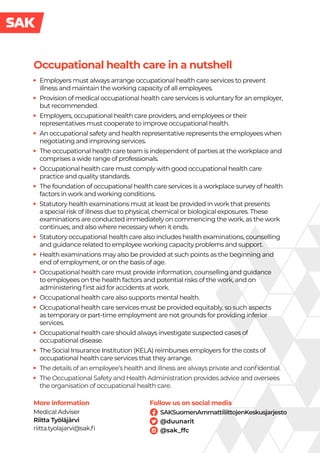Occupational health care in a nutshell
- 1. Follow us on social media Occupational health care in a nutshell SAKSuomenAmmattiliittojenKeskusjarjesto @duunarit @sak_ffc · · Employers must always arrange occupational health care services to prevent illness and maintain the working capacity of all employees. · · Provision of medical occupational health care services is voluntary for an employer, but recommended. · · Employers, occupational health care providers, and employees or their representatives must cooperate to improve occupational health. · · An occupational safety and health representative represents the employees when negotiating and improving services. · · The occupational health care team is independent of parties at the workplace and comprises a wide range of professionals. · · Occupational health care must comply with good occupational health care practice and quality standards. · · The foundation of occupational health care services is a workplace survey of health factors in work and working conditions. · · Statutory health examinations must at least be provided in work that presents a special risk of illness due to physical, chemical or biological exposures. These examinations are conducted immediately on commencing the work, as the work continues, and also where necessary when it ends. · · Statutory occupational health care also includes health examinations, counselling and guidance related to employee working capacity problems and support. · · Health examinations may also be provided at such points as the beginning and end of employment, or on the basis of age. · · Occupational health care must provide information, counselling and guidance to employees on the health factors and potential risks of the work, and on administering first aid for accidents at work. · · Occupational health care also supports mental health. · · Occupational health care services must be provided equitably, so such aspects as temporary or part-time employment are not grounds for providing inferior services. · · Occupational health care should always investigate suspected cases of occupational disease. · · The Social Insurance Institution (KELA) reimburses employers for the costs of occupational health care services that they arrange. · · The details of an employee’s health and illness are always private and confidential. · · The Occupational Safety and Health Administration provides advice and oversees the organisation of occupational health care. More information Medical Adviser Riitta Työläjärvi riitta.tyolajarvi@sak.fi
- 2. Duties and rights of an occupational safety and health representative in relation to occupational health care Occupational safety and health representatives cooperate with the occupational health service and the employer in preparing and updating the workplace survey and action plan. They also monitor implementation of the action plan and relay the experiences and wishes of employees concerning the services. Cooperation is arranged through an occupational safety and health committee at workplaces with at least 20 employees. While the occupational safety and health representative plays a vital role in ensuring that the employees are heard when planning changes in occupational health and services, responsibility for health and safety at work and for arranging occupational health services always rests with the employer. Occupational safety and health representatives may seek assistance from the occupational safety and health authorities or from their trade union if any problems arising in health factors related to working conditions or in the implementation of occupational health care cannot be settled at the workplace. An occupational safety and health representative may also: · · issue an opinion on occupational health care operations when a reimbursement application is submitted to KELA · · participate on request in drafting a report from the occupational health service concerning the harmful workload of an employee · · provide counselling and participate in occupational health or working capacity negotiations in support of an employee who so requests Aspects and operating formats of material significance to the organisation of occupational health care must be processed through a cooperation procedure. Business at small workplaces with no occupational safety and health committee or similar body may be processed with an occupational safety and health representative or with the employees. An occupational safety and health representative is entitled to: · · information from the occupational health service that is relevant to the health of employees and for improving conditions at the workplace. Information related to the health status of an individual employee may only be obtained with the express permission of that employee. · · documents related to occupational health care in order to verify that employees have been treated equitably. · · discharge duties during working hours in accordance with the Enforcement Act (44/2006) and the collective agreement for the sector. The minimum time allowances are specified in the statute and in agreements. More working time may be spent where the duties so require. · · training in assessing occupational health care and promoting the health and safety of employees. Providers of this training include trade unions and the Centre for Occupational Safety. Suomen Ammattiliittojen Keskusjärjestö SAK ry · · www.sak.fi · · sak@sak.fi


